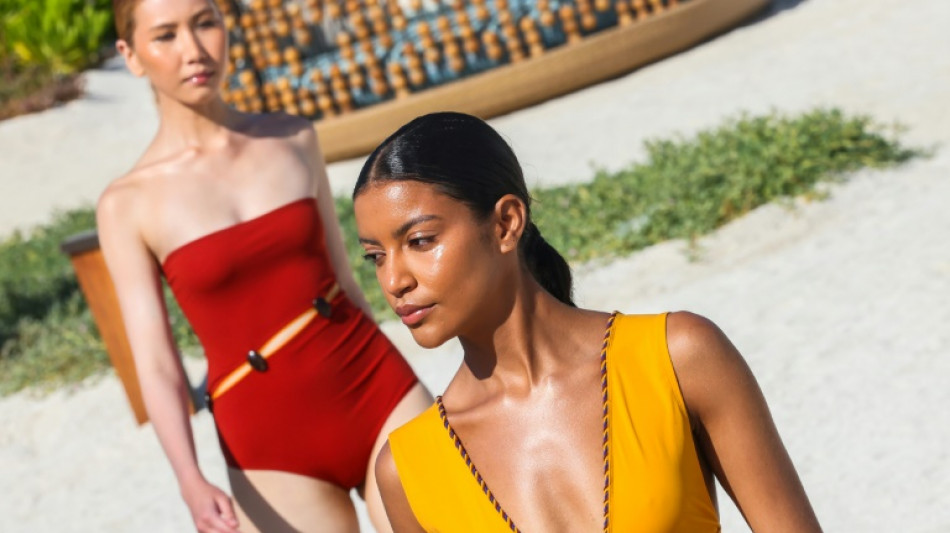
'Maldives what?': Saudi fashionistas attempt beach rebrand

Saudi designer Tima Abid got her start at a time when fashion shows were taboo and tourism, apart from religious pilgrimages, was almost nonexistent in the Gulf kingdom.
So she was as surprised as anyone to see models draped in her latest couture collection gliding down an overwater boardwalk connecting beachfront villas that go for nearly $2,000 per night.
The sunset show on Thursday kicked off Saudi Arabia's first Red Sea Fashion Week, pitched by organisers as a milestone both for Saudi fashion and for a nascent tourism sector whose growth is key to diversifying the economy of the world's biggest crude oil exporter.
Abid's collection of two dozen "resort wear" dresses featured flowing white and beige fabrics and only the occasional visible midriff.
A second show on Friday was billed as the first to focus on women's swimwear, an envelope-pushing development in a conservative Muslim country that less than a decade ago required women to wear body-covering abaya robes.
"You may say it is boldness, but I look at it in another way: keeping pace with globalism," Abid told AFP while surrounded by models and harried, headset-wearing show producers.
"The borders and restrictions that used to exist have been abolished, and this has given us an opportunity to show our creativity in a more beautiful way."
The crowd on Thursday included designers, fashion journalists and Saudi celebrities like Lojain Omran, best known abroad for her turn on the money-drenched Netflix show "Dubai Bling".
The range of designs on display demonstrated Saudi Arabia's seriousness about competing not just with Dubai but other fashion capitals, Omran said.
"If you want to reach a global audience in fashion, you have to reach all types of people -- the conservatives, and those who are the opposite," she said.
- 'Something very new' -
The setting for Red Sea Fashion Week, the St Regis Red Sea Resort on Ummahat Alshaikh island off Saudi Arabia's west coast, is accessible only by chartered boat or seaplane.
It is part of Red Sea Global, one of the so-called giga-projects at the heart of Saudi Arabia's Vision 2030 social and economic reform programme overseen by Crown Prince Mohammed bin Salman.
As doubts grow about the feasibility of the most prominent giga-project -- a planned futuristic mega-city known as NEOM -- officials involved in Red Sea Global stress they are making progress, opening two resorts last year and preparing to launch 14 more hotels by the end of next year.
Since debuting a general tourism visa in 2019, formerly closed-off Saudi Arabia has tried to dispel the notion that it is one giant desert, showcasing mountains in the south and securing hosting rights for the Asian Winter Games in 2029 in a region of NEOM known as Trojena.
Beach developments are seen as major potential attractions, and Red Sea Fashion Week was partly intended to highlight what is already in place, said Burak Cakmak, chief executive of the Saudi Fashion Commission.
"Obviously logistically we are trying something very new. We are on a remote island that takes half an hour by boat to get to... There are many limitations on being able to do shows here," he said.
"I would love everybody not (only) to explore Saudi designs, but also explore Saudi as a destination."
Taking in preparations for Abid's show, Saudi designer Alanoud Badr of Lady Fozaza compared the kingdom favourably to a more established island locale.
"It's just something you would never expect, and honestly all I can say is, Maldives what?"
- Image woes -
Saudi Arabia is forging ahead with its fashion and tourism investments even as the war in Gaza drags down economic growth prospects for the wider region.
In a recent interview with AFP, Saudi Tourism Minister Ahmed Al Khateeb said attacks on Red Sea shipping by Yemen's Huthi rebels -- intended to show solidarity with Palestinians in Gaza -- posed no threat to the new resorts.
Besides security fears, Saudi Arabia's tourism industry has to overcome continued criticism of the kingdom's human rights record, including repression of dissent under Prince Mohammed.
Those who flocked to the St Regis paid little mind to such issues.
Model Beatris Resende said that growing up in Brazil, she often thought of the Middle East as a single place that was not depicted very flatteringly.
Only through travelling and modelling in the region has she come to appreciate differences among countries.
"I'm going to be honest. I really want people to stop looking at countries as the stereotype and actually get to know the places," she said.
"It's so much more than what we hear.
O.Pileggi--PV
